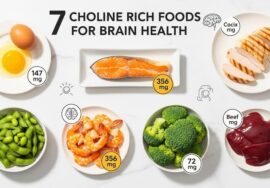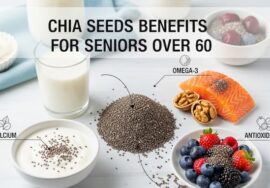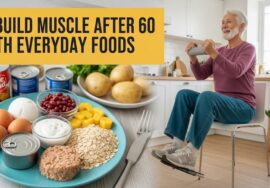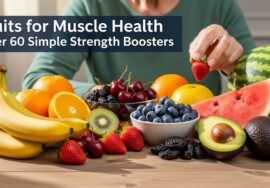If you’ve been avoiding certain foods because of something you read in a headline, you’re not alone. A lot of food myths still exist—not because of solid science, but because of media spin. Real foods with solid nutritional value have been unfairly labeled as harmful for decades. Here’s the truth behind what you’ve been told.
Table of Contents
- Coconut Oil Was Never the Problem
- Salmon Got Labeled ‘Too Fatty’
- Butter Was Replaced by Something Worse
- Dark Chocolate Isn’t Junk
- Eggs Do Not Raise Your Cholesterol Dangerously
- Potatoes Were Blamed for What People Added to Them
- Red Meat Got Thrown in with Processed Meat
- Whole Dairy Fat Was Wrongly Blamed
- Bread Isn’t Always Bad
- Salt Was Oversimplified
- Quick Snapshot: The Myths vs. Facts
- Questions People Ask
- Closing Thought
1. Coconut Oil Was Never the Problem
Coconut oil was targeted because it’s high in saturated fat. But the kind of fat in virgin coconut oil behaves differently in the body. It contains MCTs, which your body burns for energy. These fats are not the same as hydrogenated oils.
👉 Reality: Using small amounts of cold-pressed coconut oil for cooking isn’t dangerous. It’s a stable oil, ideal for high heat.
2. Salmon Got Labeled ‘Too Fatty’
Yes, salmon has fat. That’s the benefit. Wild-caught salmon is rich in EPA and DHA, two omega-3s that help keep blood vessels flexible and reduce inflammation.
👉 Reality: Salmon supports brain health and heart rhythm. The fat is part of the benefit, not a flaw.
3. Butter Was Replaced by Something Worse
During the margarine craze, butter was dismissed. Now we know that trans fats—often found in margarine—are more harmful than the natural fats in butter. Grass-fed butter contains vitamins like K2 and healthy saturated fats.
👉 Reality: Real butter, in modest portions, is far better than processed spreads.
4. Dark Chocolate Isn’t Junk
When you hear “chocolate,” you might think candy bars. But dark chocolate (70%+ cocoa) is rich in antioxidants. It supports blood flow and contains iron and magnesium.
👉 Reality: It’s not about banning chocolate—it’s about choosing the right kind.
5. Eggs Do Not Raise Your Cholesterol Dangerously
Old studies linked eggs to heart disease. That connection was overblown. Eggs are one of the most complete natural foods—offering choline, protein, and key vitamins.
👉 Reality: One egg per day is fine for most people, even those watching cholesterol.
6. Potatoes Were Blamed for What People Added to Them
It’s not the potato. It’s the fries, the butter-soaked mash, and the toppings. A plain potato with skin is a source of potassium, fiber, and resistant starch.
👉 Reality: A boiled potato can be part of a balanced meal. What you put on it matters more.
7. Red Meat Got Thrown in with Processed Meat
Media coverage often blurs the line between natural red meat and processed meats like deli slices. Lean red meat contains iron and B12 and supports muscle recovery.
👉 Reality: The type of meat and how it’s cooked matters more than the color.
8. Whole Dairy Fat Was Wrongly Blamed
Whole milk and yogurt were tossed aside during the low-fat era. But full-fat dairy is more filling and supports hormone function. Fat-free versions often come with added sugar.
👉 Reality: Eating the full-fat version may help with satiety and nutrient absorption.
9. Bread Isn’t Always Bad
Sourdough and wholemeal breads are very different from refined white bread. Sourdough undergoes fermentation, which helps break down gluten and supports digestion.
👉 Reality: Bread isn’t the enemy. The ingredients and process determine how your body reacts.
10. Salt Was Oversimplified
The “salt raises blood pressure” narrative missed the mark. The real issue is processed food loaded with refined salt. Natural salts like sea salt and Himalayan pink salt contain trace minerals your body needs.
👉 Reality: The amount and source of salt matter. Blanket fear of all salt is misleading.
Quick Snapshot: The Myths vs. Facts
| Food | Media Said | What’s Actually True |
|---|---|---|
| Coconut Oil | Clogs arteries | Contains MCTs, good for metabolism |
| Salmon | Too fatty | High in omega-3s, heart protective |
| Butter | Worse than margarine | Natural fat, contains vitamin K2 |
| Dark Chocolate | Just candy | Rich in antioxidants, iron, magnesium |
| Eggs | Raise bad cholesterol | Good source of protein and choline |
| Potatoes | High carb junk | Potassium-rich whole food |
| Oysters | High cholesterol | Low-calorie, nutrient-dense seafood |
| Red Meat | Causes disease | Lean cuts are full of iron and B12 |
| Whole Dairy | Makes you fat | Supports appetite control and hormones |
| Sourdough | Causes glucose spikes | Easier to digest and less processed |
| Salt | Always harmful | Natural salt is essential in small amounts |
Questions People Ask
1. Is butter really better than margarine?
Yes. Margarine often contains industrial fats. Grass-fed butter is minimally processed.
2. Can I eat eggs every day?
For most healthy adults, yes. One to two eggs a day is fine if you eat a balanced diet.
3. What kind of bread is okay?
Look for fermented sourdough or sprouted grain breads without added sugar.
4. Should I cut all red meat?
No. Unprocessed, grass-fed cuts are different from deli meats or sausages.
5. Is salt ever good?
Unrefined sea salt in moderation helps with hydration and nerve function.
Closing Thought
The media has a pattern of simplifying complex nutrition science. They turn real food into villains and often push processed substitutes. By understanding the context and quality behind each food, you can make better choices without the guilt or confusion.








